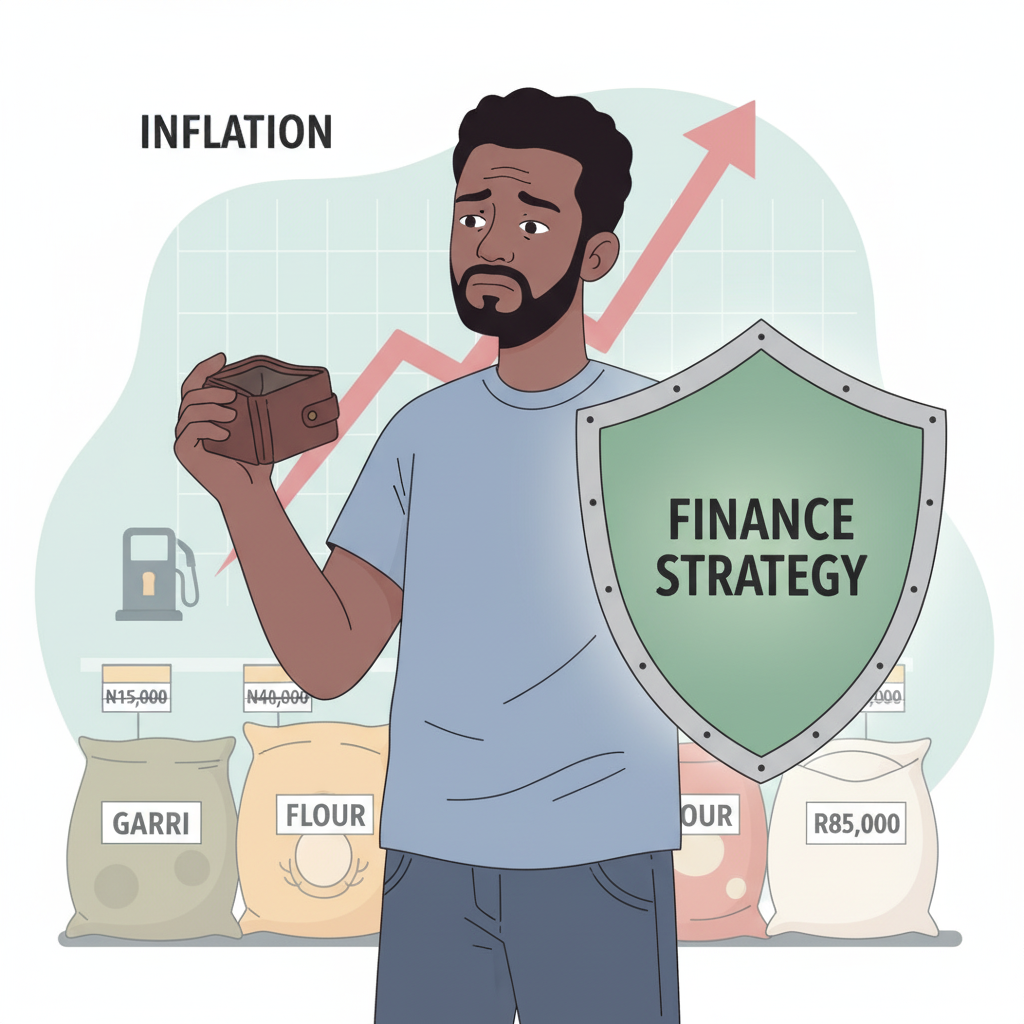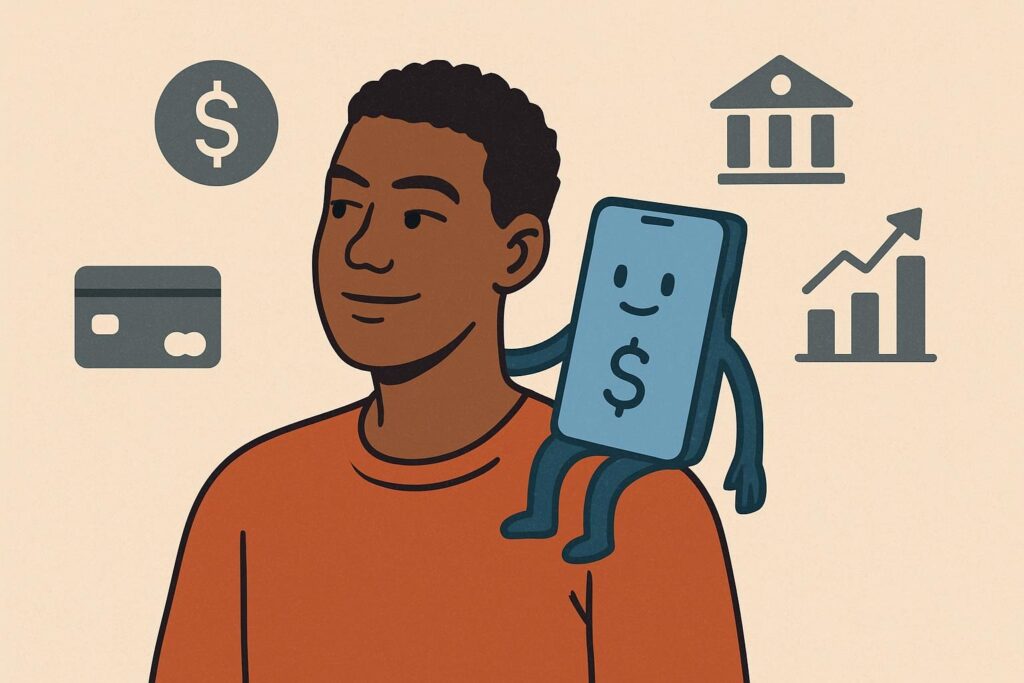Inflation has become that uninvited guest that refuses to leave. Every month, prices go up a little more, and your salary feels a little smaller. Garri, flour, rice, rent, transport, fuel — everything seems to be on a race of its own.
Here’s the truth: inflation doesn’t have to derail your finances. In the last two blog posts of this “Inflation and Your Money” series, I covered everything you need to understand about the topic. Now, I want to show you how to build a solid financial strategy that not only combats inflation but keeps you one step ahead of this silent threat.

Yes, inflation is real. Yes, it’s challenging. But with the right knowledge and consistent action, you can protect your savings, stay ahead, and even leverage inflation to your advantage.
This post will show you how.
The Mindset First: Awareness, Not Panic
Before we talk about money moves, let’s fix the mindset.
Most people react to inflation with panic — cutting corners, blaming the government, or withdrawing all their savings to “hold cash.” But panic is not a strategy. Awareness is.
Start by understanding your spending patterns. Track where your money goes every day. This gives you control. You’ll begin to see what to cut back on and what’s truly important.
If you’ve been following the FINTEL Warriors Expense Tracking Challenge, you already know how powerful awareness can be.
It’s like switching on a light in a dark room — you can finally see what’s tripping you.
So before you do anything fancy, take inventory of your financial life. Write it down. What do you earn, spend, save, owe, and own? That clarity is the foundation for everything else.
Stop Relying on Plain Savings Accounts
Let’s be honest — traditional bank savings accounts don’t protect you from inflation.
When your bank pays you 4% interest per year and inflation is 27%, you’re not earning; you’re losing 23% of your money’s value quietly. That’s why your ₦500,000 in January feels like ₦350,000 by December.

So, what’s the smarter play?
Start by using inflation-beating savings options — high-yield fintech savings platforms, short-term Treasury Bills (T-Bills), and money market funds.
Apps like PiggyVest, Cowrywise, or Moniepoint MFB now offer secure investment options with better returns. You can check them out.
If you prefer government-backed options, check FGN Savings Bonds or T-Bills from the Central Bank of Nigeria. They’re low-risk and give higher yields than regular savings.
👉 Rule of thumb: Any savings account paying you less than the inflation rate is silently eating your money.
Multiply Your Income Streams (Smartly)
You can’t save your way out of inflation — you earn and invest your way out.
And in this economy, depending on just one source of income is risky.
Whether you’re a civil servant, entrepreneur, or freelancer, you need multiple cash flows.
That doesn’t mean juggling five jobs. It means turning what you already know into value.

Here are a few practical ideas for Nigerians:
- Freelance on global platforms like Upwork or Fiverr. Offer writing, design, or virtual assistance.
- Start a side business — food delivery, laundry, baking, or digital products.
- Monetize your skills — teach online, host paid webinars, or create digital templates.
- Try value-added reselling — buy in bulk and sell in smaller units with a margin.
- Offer consulting in your area of expertise — you’d be surprised who will pay for what you already know.
As I always say,
“You can’t fight inflation on a fixed income.”
If your income doesn’t rise as fast as prices do, you’ll always feel behind.
Invest in Assets That Outpace Inflation
Inflation is an enemy to cash, but a friend to productive assets.
The wealthy know this — they put their money in things that grow faster than prices rise.
Here’s where you can start:
- Equities (Stocks): The Nigerian Exchange (NGX) has stocks and mutual funds that historically outpace inflation. Look for dividend-paying companies with consistent performance.
- Real Estate: Even a small plot in an emerging area appreciates over time. Landlords often raise rents as inflation rises.
- Commodities: Gold, silver, and agricultural commodities tend to rise with inflation.
- Inflation-Linked Bonds: These are designed to rise in value as inflation increases. Ask your investment platform or stockbroker about them.
- Fintech Investments: Apps like Trove, Risevest, and Bamboo let you invest in both local and global assets. Always do your due diligence — check their SEC registration and risk profiles.
The goal isn’t to chase every trend. It’s to own assets that work while you sleep — and keep pace with the cost of living.

Mini Comparison Table: Where to Keep Your Money in 2025
| Investment Type | Expected Annual Return (₦) | Liquidity | Risk Level | Quick Note |
|---|---|---|---|---|
| Bank Savings | 4% – 6% | Very High (Instant) | Very Low | Safe but barely beats inflation. Ideal for emergency funds only. |
| T-Bills (FGN) | 10% – 15% | Medium (91–364 days) | Low | Government-backed, steady returns. Great for short-term saving. |
| Equities (Stocks) | 18% – 30%+ (variable) | Medium–Low | Medium–High | Higher reward potential but market fluctuates. Think long-term. |
| Fintech Savings (PiggyVest, Cowrywise) | 10% – 17% | High (withdrawal rules apply) | Low–Medium | Convenient, disciplined, and beats bank returns. Check platform credibility. |
✅ Tip: Mix them. Keep 20–30% of your money liquid (bank/fintech), 30–40% in stable returns (T-Bills), and the rest in growth assets (equities, business, real estate).
Short-Term Survival Tactics for Tight Months
Let’s get practical. What do you do when things are already tight?
Here are five things that work:
- Prioritize essentials — rent, food, transport, power.
- Renegotiate bills — cable, rent, or school fees; many can be split into instalments.
- Pause non-essential subscriptions — that Netflix or gym bill can wait.
- Buy in bulk — it saves you from paying inflated prices every week.
- Join cooperative or savings groups — it forces discipline and gives access to soft loans.
Small changes compound fast. Remember, financial fitness is a muscle — you strengthen it by consistent use.
Use Fintech Investment Platforms, But Know the Risk
Technology has made financial growth easier than ever before — but also riskier if you’re careless.
Fintech apps like PiggyVest, Cowrywise, Bamboo, and Risevest can help automate your savings and investments.
But before you trust them with your money:
- Verify they’re registered with the SEC or CBN.
- Read reviews and confirm withdrawal reliability.
- Start small. Test with small amounts before you go big.

The 30-Day Inflation Plan (FINTEL Action Step)
Here’s a simple plan to help you get started right away:
Week 1: Track your daily expenses using the FINTEL Expense Tracker. Could you identify the leaks?
Week 2: Build your one-month budget. Prioritise needs over wants.
Week 3: Open an investment account on a verified platform. Move 10–20% of your income there.
Week 4: Automate transfers. Review your spending. Adjust what’s not working.
Remember, awareness + consistency = transformation.
Final Thoughts
Inflation is here to stay — but you don’t have to be a victim of it.
Financial freedom doesn’t come from luck or government policy; it comes from knowledge, discipline, and small, consistent actions.
If you start with awareness, diversify your income, and let your money work for you, you’ll not just survive inflation — you’ll grow through it.
So, what’s your next step?
Join the FINTEL Warriors Community, download the tracker, and start your own 30-day plan today.
Your journey to financial freedom starts now.

Pingback: Why You Should Stop Living Within Your Means - FintelCoach